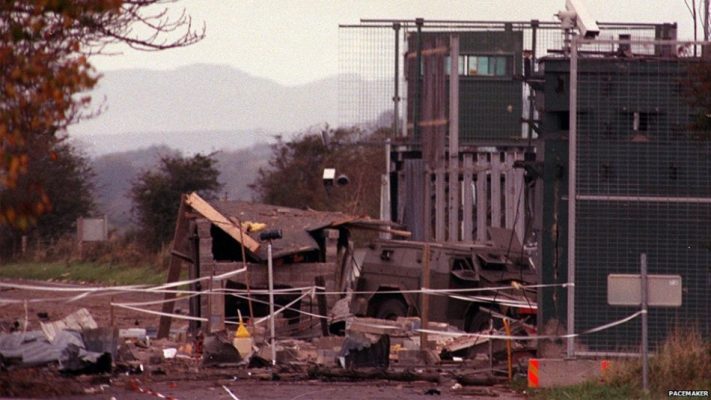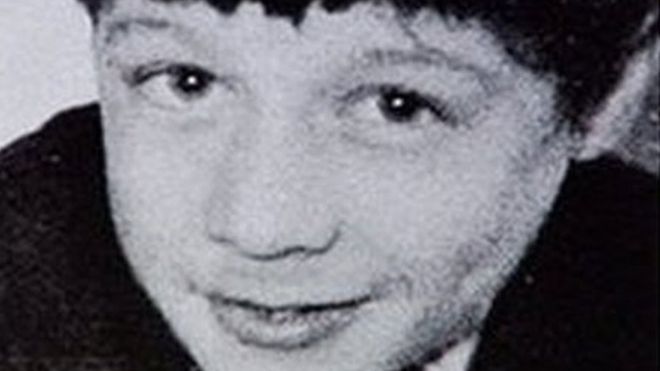
British Army checkpoint at Buncrana Road Derry blown up in October 1990 by IRA ‘human bomb’ which claimed the life of Patsy Gillespie who was strapped into bomb-laden car
Mr Lewis said the government planned to bring legislation through Parliament by the autumn.
Speaking in Westminster on Wednesday, Mr Lewis said the plan was a “painful recognition of the reality of where we are”.
“The past is a constant shadow over those who directly experienced the horror of those times,” he said.
“It is clear that the current system for dealing with the legacy of the Troubles is not working.
“It is now a difficult, in fact painful truth, that the focus on criminal prosecutions is increasingly unlikely to deliver successful criminal justice outcomes.”
Mr Lewis said the legislation would include three parts, with a statute of limitations part of it, which would “apply equally to all Troubles-related incidents”.
He said an independent body would also be set up which will focus on truth and reconciliation, with powers to gather information about killings during the Troubles.
DUP leader Sir Jeffrey Donaldson said the plans were “totally unacceptable and will be rejected by everyone in Northern Ireland”.
“There can be no equivalence between the soldier and police officer who served their country and those cowardly terrorists who hid behind masks and terrorised under the cover of darkness. We find any such attempted equivalence as offensive,” he said.
“The Democratic Unionist Party, both publicly and privately, has, and continues to oppose any form of amnesty. Everyone must be equal under the law and equally subject to the law.
“We will oppose any plans that give an effective amnesty to those who murdered and maimed over many decades.
“Whilst we understand that with the passage of time the prospect of justice is diminishing for many but these proposals, if passed, will extinguish that flickering flame of justice completely and is a moral overreach that cannot be accepted.”
Earlier at PMQs, Labour Leader Sir Keir Starmer challenged British Prime Minister Boris Johnson on the proposals, with the politician referencing his time working in Northern Ireland with the PSNI Policing Board and as Director of Public Prosecutions.
“A blanket amnesty, including for terrorists, is plain wrong. I was in Northern Ireland last week and it is absolutely clear that the government’s amnesty is not supported by the political parties in Northern Ireland and it is not supported by victims’ groups.
“I spoke to victims of terrorism at the Wave Trauma Centre in north Belfast…they haven’t even been properly consulted on this proposal.
“If things are to move forward in Northern Ireland, any discussion has to start with the victims.
“Politicians in London can’t simply draw a line under terrorism and other crimes.”
The expected government statement follows significant recent developments in a number of high-profile Troubles prosecution cases.
In May, two former paratroopers were acquitted of the 1972 murder of Official IRA man Joe McCann after their trial collapsed due to the inadmissibility of prosecution evidence.
Both soldiers had been interviewed by a police legacy unit, the Historical Enquiries Team (HET), in 2010 and it was that evidence which formed a substantial part of the prosecution’s case.
But the judge ruled that evidence inadmissible and as the Public Prosecution Service (PPS) did not appeal against that decision, the case could not proceed.
Then, earlier this month, the collapse of the McCann murder trial had implications for two other high-profile cases – the ‘Soldier F’ Bloody Sunday trial and the prosecution for the murder of 15-year-old Daniel Hegarty.
The PPS met the families of Daniel Hegarty and two men killed on Bloody Sunday to explain that given “related evidential features” to the McCann case, prosecutors no longer believed there was a reasonable prospect that key evidence against the soldiers accused of their loved one’s murders would be ruled admissible.

Daniel Hegarty was shot dead by a British soldier in Derry in 1972
John Kelly, whose brother Michael was killed on Bloody Sunday, said the reported proposals deny many victims’ families justice.
“The message they are sending out is that if you wear a British army uniform you are protected,” he told BBC Radio Foyle.
“We are hoping it does not happen and we will fight it as best we can.”
Mary Hamilton was injured in the Claudy bombings in 1972, an attack that claimed the life of her brother-in-law.
She said a blanket ban on prosecutions would both anger and disgust victims’ families and the wider public.
The government was effectively saying the lives of those killed before 1998 “were not worth anything”, she said.
Tags:




